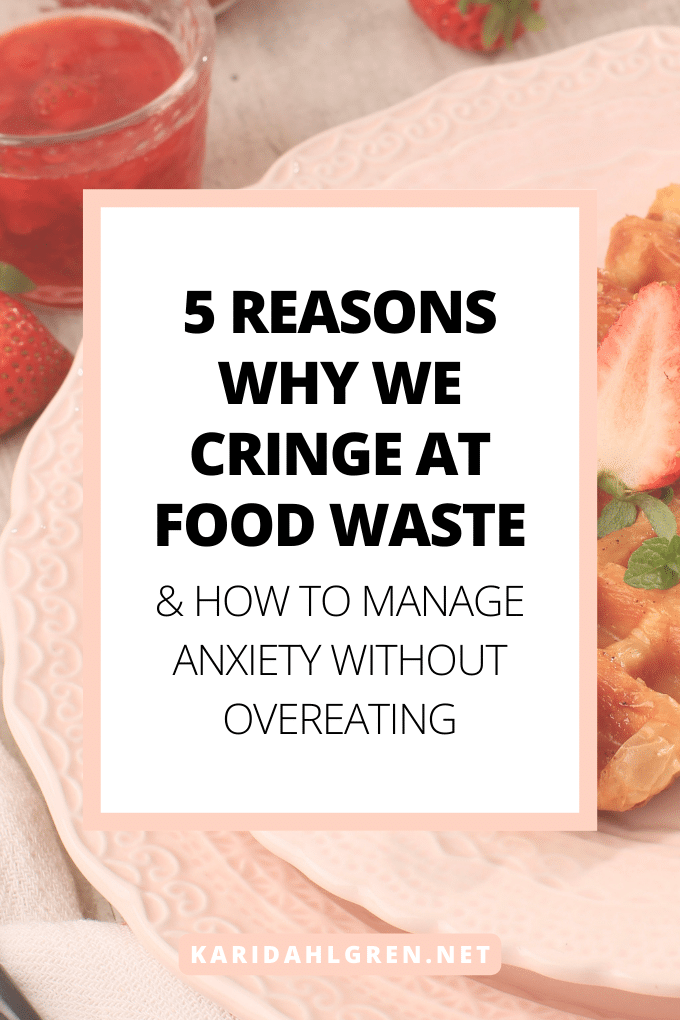
Do you ever eat beyond the point of fullness just to avoid food waste? The fear of wasting food is a deep-seated trigger, compelling many of us to overeat in attempt to avoid feelings of guilt—only to be followed by feelings of shame or body dissatisfaction.
As a wellness coach that specializes in eating psychology, this post dismantles the limiting beliefs that fuel a fear of wasting food. Together, we’ll unwind the psychology behind this sensitive topic and illuminate steps to reducing the global impact of food waste.
The Limiting Beliefs That Fuel the Fear of Wasting Food

When it comes to the fear of wasting food, there seem to be five major triggers, which I like to call The Big Five: the fear of missing out, the guilt complex, clean-plate programming, financial anxiety, and social responsibility. Just from that list alone, can you see why the fear of wasting food is a touchy topic for so many of us? Let’s unpack it brick by brick.
Here are “The Big 5” reasons behind the fear of wasting food:
1. You’re Afraid of Missing Out
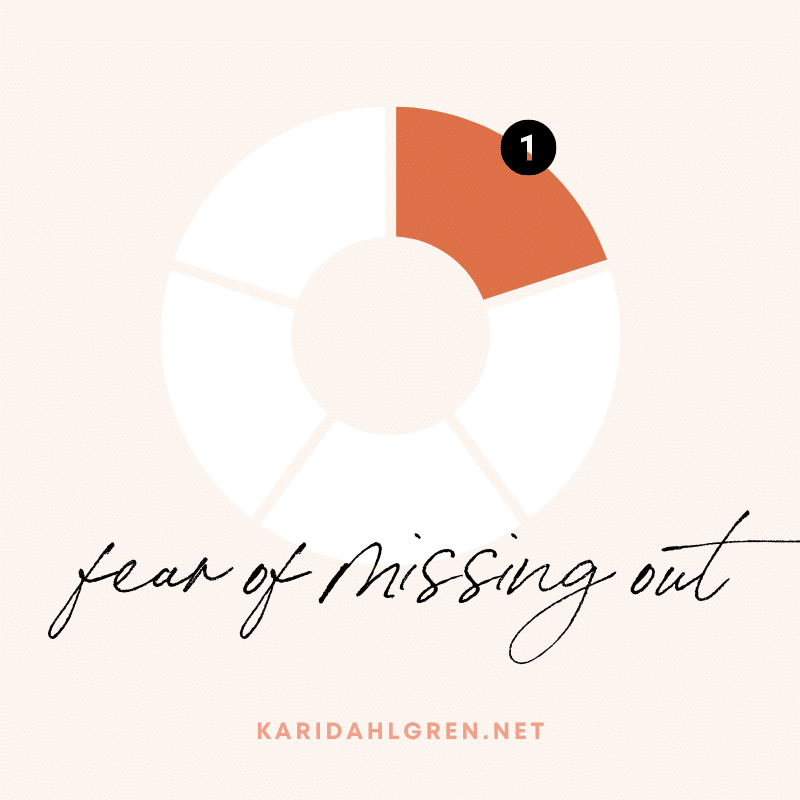
Wasting food often triggers a fear of missing out (FOMO) on both the full sensory and social aspects of a meal. If you stop eating while others continue to enjoy their meal, it can heighten this sense of missing out. This fear extends to leftovers as well, as they often don’t taste as good the next day, enhancing the fear of losing out on a flavorful experience.
This phenomenon ties into hedonic eating, a pattern that surpasses nutritional needs and focuses on eating for pleasure—particularly in regard to hyperpalatable foods (those rich in sugar, fat, and salt). Hedonic eating is influenced by the brain’s reward system and the allure of pleasurable foods[1], which can also heighten the fear of missing out on the sensory experience.
A tip moving forward: If hedonic eating is something you identify with, it’s crucial to develop strategies that mitigate the fear of missing out on food’s sensory pleasures, directly addressing your fear of food waste.
One effective approach is to cultivate joy outside of food. This broader perspective can decrease the emphasis on food as the primary source of joy and reduce the anxiety linked to food waste, at least in regard to FOMO-driven anxiety.
2. You’re Afraid of Feeling Guilty, Judged, or Anxious Around Food Waste
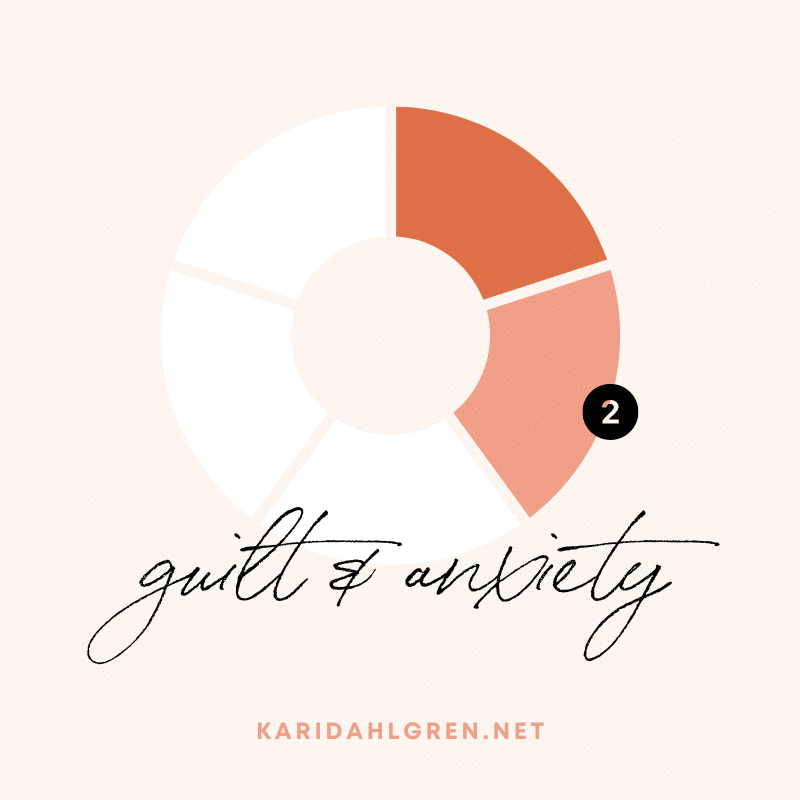
Ever had the nagging concern that people might be silently judging you for wasting food? The fear of being judged may trigger overeating simply to avoid calling unwanted attention to yourself. It’s important to note that when a fear of being judged becomes debilitating, it could be a characteristic of social anxiety disorder, and psychotherapy may offer effective relief.[2]
When you feel guilty or anxious for leaving behind food on your plate, it can elevate stress levels. This anxiety, in turn, might trigger overeating as a way to cope, even without the presence of physical hunger. Higher anxiety levels have been shown to correlated with loss of control over eating, which can make it even harder to stop at fullness.[3]
A tip moving forward: As you navigate anxiety around wasting food, you can support yourself by learning to coexist with uncomfortable emotions like guilt, anxiety, the fear of being judged (which falls into anxiety), and the fear of missing out (which also falls into anxiety).
One way to get there is by practicing distress tolerance-enhancing tools like my Stop, Drop, & Feel method, which asks you to sit still with the uncomfortable emotions that bubble up in the precise moment that you want to eat beyond fullness. Through practice, you can develop the emotional resilience necessary to weather the anxiety that surfaces with the fear of wasting food.
3. Your Childhood Conditioning Is Hijacking Present Behavior
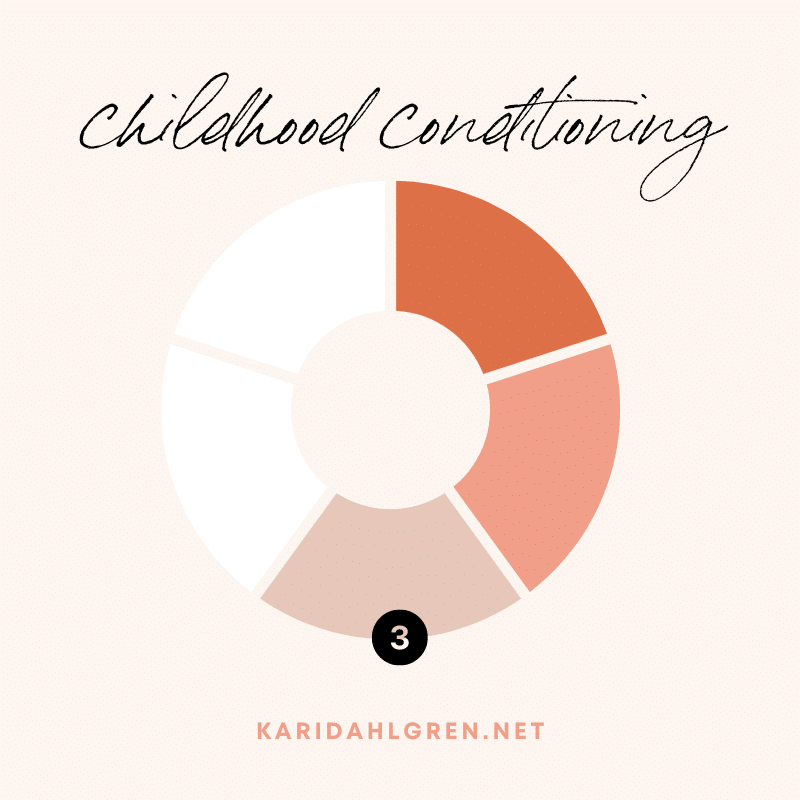
Were you ever told as a child that you must finish everything on your plate before leaving the table, either to receive praise or avoid guilt? Such controlled feeding practices, whether it’s pressuring children to eat or using food as a reward, are widely discouraged but remain prevalent.[4] These practices create generations who fear wasting food, often leading to overeating.
If you grew up worried about not having enough food, whether due to financial hardship or a family culture emphasizing every bite’s value, this could deepen your anxiety around wasting food. Common scenarios include sibling competition over food, parental insistence on clearing your plate to prevent waste, and periods of scarcity that instill a compulsion to consume or even hoard more than needed. These experiences can foster a pattern of eating driven by fear and anxiety rather than hunger.
A tip moving forward: To confront and overcome these deep-seated beliefs, reflect on their origins and impacts on your eating behaviors. Journaling can be an effective tool to bring these subconscious beliefs into your conscious awareness, helping you understand and heal your relationship with food.
My bestselling workbook, Why We Do the Things We Do, although not exclusively focused on food waste, provides much-needed relief by uncovering the limiting beliefs that fuel unwanted eating habits. Awareness precedes change, and this workbook helps illuminate the path forward.
4. You Associated Wasting Food With Wasting Money
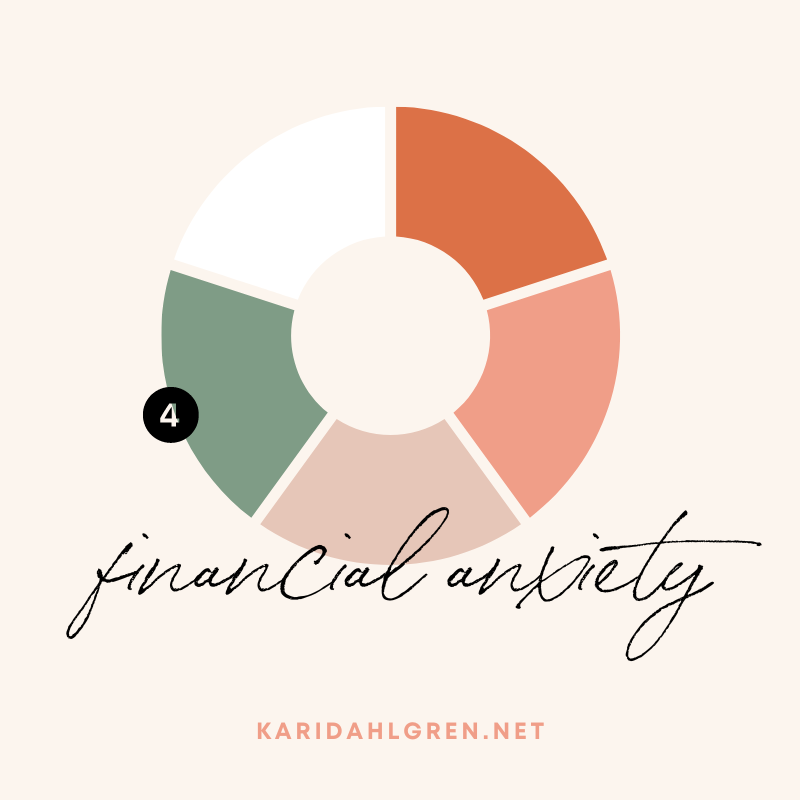
On a Quora thread about whether or not food waste bothers people, a woman shared, “Now food isn’t cheap and I work hard for my money, in my eyes you are just taking your money and throwing it in the garbage bin (which I dare you to do and not look back).”
Many of us can relate to this. We spend $20 on a meal, and if we get full halfway through, we feel like we are essentially throwing $10 down the drain. Even if we take it to-go it can trigger the fear of wasting flavor or experience.
However, unlike those who view wasted food as throwing money in the trash, I personally like to reframe it as throwing money in a piggy bank that’s an investment in my health by not overeating. The money never comes out of the piggy bank, but the more money invested, the better off my health is.
A tip moving forward: Grab a pen and paper and answer the following question: If I could wave a magic wand have have a “perfectly” peaceful relationship with food by tomorrow—and it would never go away—how much would I pay for that peace of mind? Sometimes, getting clear how how much we value feeling normal around food can help us devalue the money “wasted” on a meal half-eaten. And remember, a meal can always be taken to-go.
5. You Value Sustainability and Stewardship
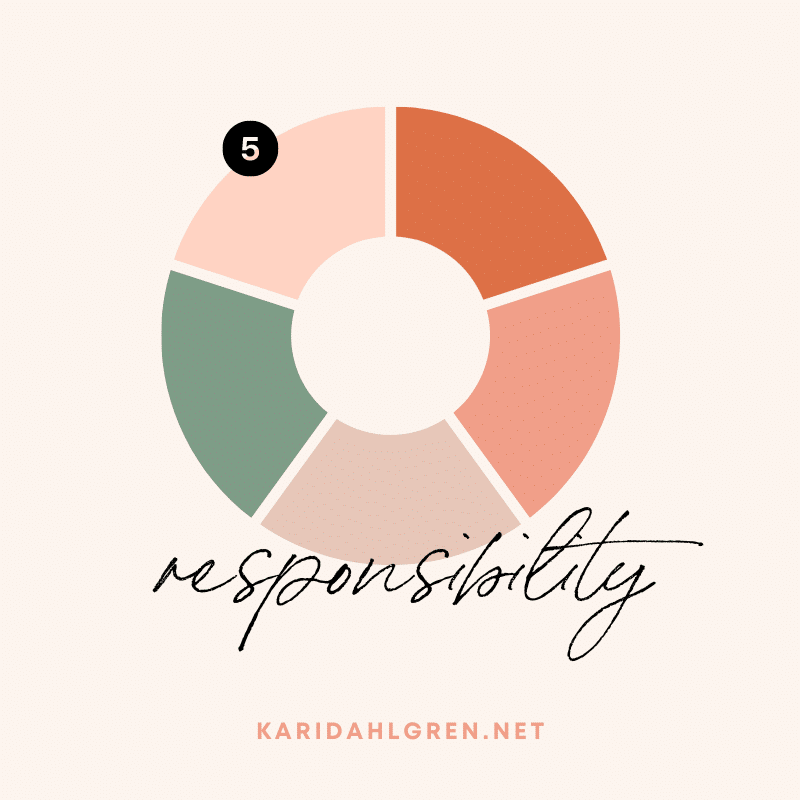
Cleaning your plate to avoid waste might seem beneficial, but it does little to address global hunger or reduce environmental issues. In fact, overeating in the name of reducing food waste can lead to food overproduction, which exacerbates deforestation, increases water usage, boosts transport emissions, and generates more packaging waste.
Furthermore, Lynne Twist emphasizes in The Soul of Money that donating to hunger relief without careful consideration can foster dependency rather than empowerment. Similarly, eating in excess under the guise of avoiding waste contributes neither to solving world hunger nor to reducing environmental impact. Instead, we should focus on conscious consuming and thoughtful giving, aimed at supporting long-term self-reliance and sustainability.
Remember, respecting cultural norms and the planet doesn’t mean overeating, but rather making mindful choices that align with both personal health and global well-being.
Some tips moving forward:
- Embrace meal planning: Plan your meals in advance to prevent unnecessary purchases and optimally use what you have.
- Take it to-go: Whether it’s a meal from a restaurant or a meal that someone cooked for you, eat until you are full, and then take the rest to go.
- Make the most of leftovers: When you do take food to-go, transform leftovers into new meals like stir-fries or soups.
- Create a weekly “clean out meal”: To reduce food waste, you can use food nearing the expiration date to create a “clean-out” meal that puts the food to use.
Embrace Acceptance in the Face of Inevitable Food Waste, Marie Kondo-Style
By now, I hope you’re starting to feel more self-compassion through self-understanding. There are many good reasons for cringing at the thought of food waste, and I hope that this awareness alone helps you take one step closer to feeling normal around food.
With self-understanding in tow, along with plenty of tips for translating this awareness into daily practices, let’s discuss what to do when food waste is unavoidable despite your best intentions.
Have you ever heard that you should thank an object before discarding it? This tip was popularized by Marie Kondo and her bestselling book, The Life-Changing Magic of Tidying Up. It is rooted in the Japanese religion of Shintoism, which believes that every object has a spirit, or kami—and food is no exception.
Yes, that’s right – I’m encouraging you to thank your food for the purpose it has served in your life before you throw it away.
Especially if you cringe at the thought of wasting food, I encourage you to thank your food for the purpose it served in your life before discarding it. Even if food was not used for its primary purpose of physical nourishment, it often provides mental or emotional benefits, such as a sense of abundance, a sense of having options, or the simple comfort of a full fridge. Embracing gratitude, not guilt, for these contributions can be a highly transformative practice.
The Path to Making Peace with Food Is Psycho-Spiritual
In this light, a psycho-spiritual approach helps address the full spectrum of your interactions with food—from the moment it comes into your life to the moment it leaves. It invites a holistic view that incorporates your emotions, spirit, and physical body, fostering a deeper understanding and respect for true nourishment.
For those inspired to delve deeper into this transformative approach, my free ebook, The Spiritual Seeker’s Guide to Stop Binge Eating, serves as an essential next step. It provides even more inspiration for making peace with food without focusing on food at all:

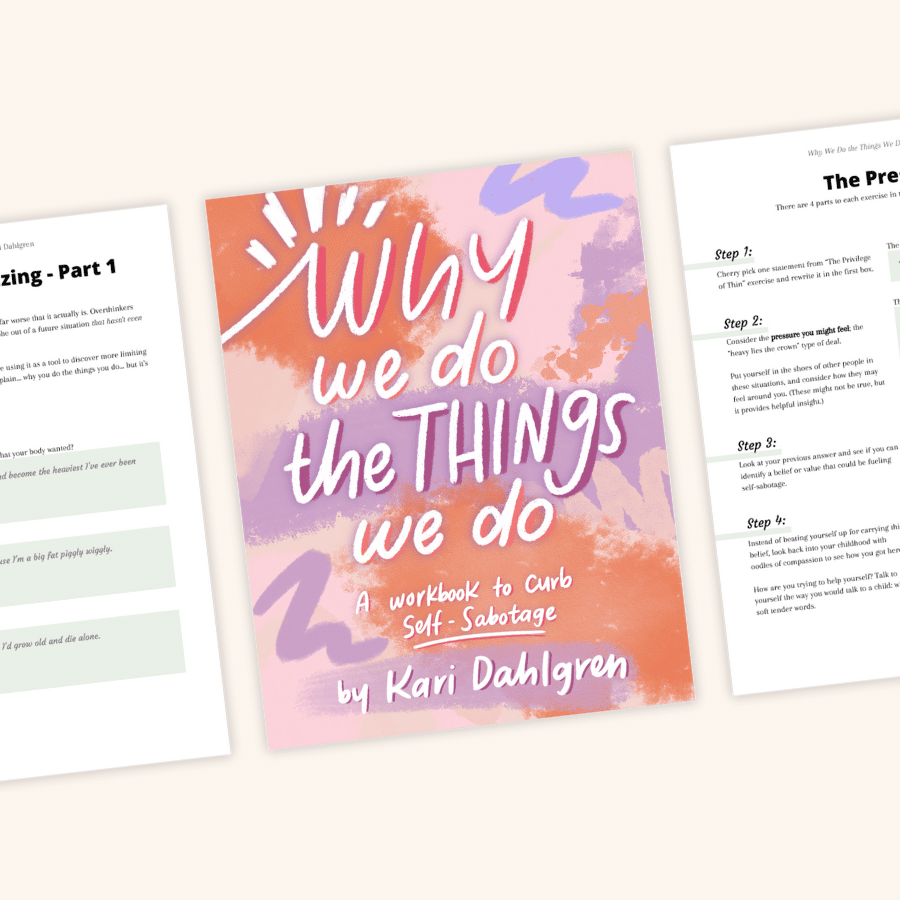
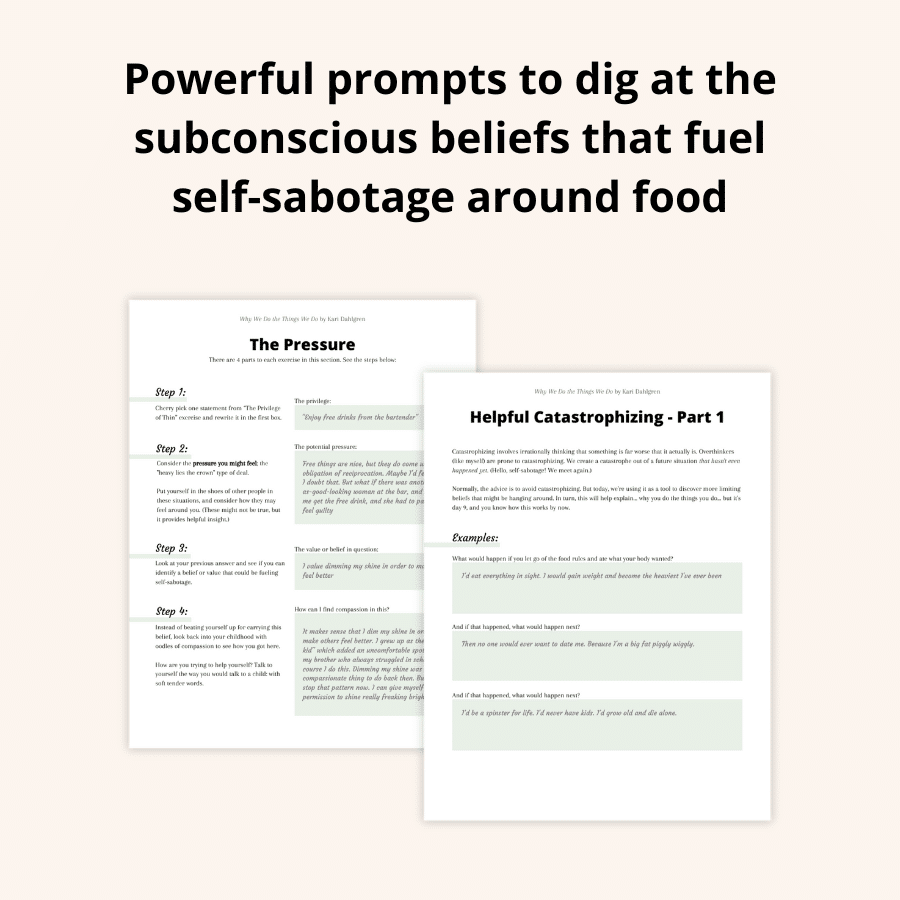



Love it, Kari!
Thanks Emi!
Excellent article. I have another one for you that goes along with 4. Make a difference. I feel very guilty to throw away food due to environmental reasons. If I cooked more than needed, this is a big issue for me, even if it is leftover food from my kids. I try to now just put it into the fridge but then something else goes bad. Buying only what is really needed is the ultimate goal of course..
Agreed, Eva! It’s a fine balance between diligence and compassion.
Such a great text! Thank so much for sharing this!
Thanks Tatiana!
It’s a tough one for me. In my short life so far I’ve been through 2 financial crises where I didn’t have enough food and was forced to lose 20-30 pounds (I know, it’s not a dream come true!). So the financial one still kind of makes sense to me, I have to pack up the pounds when I’m able.
I’m sorry to hear about the hardships Andrew. This is why these blocks are the hardest — they’re so REAL.
I have a tendency to finish food I don’t even like because of not wanting to waste the money I spent on it, and while I don’t have a binge eating problem, your advice here helped motivate me to go ahead and throw away a package of God-awful chips my roommate gave to me to finish. Money well-spent.
Rock on Natassja!!
For me it’s not so much about wasting food, it’s about viewing food as an opportunity. If I see something I like, I wonder when the next time I’m going to have the opportunity to eat it again. I also feel like I have to take it now before someone else does.
Oooo it’s almost like there’s a little FOMO in there. I might need to add this to the article!! Thanks for your input
FOMO is a huge part of it for me as well. And I shame myself for that reasoning because I purchase food items to feel included and end up wasting a lot of it on the process. I struggle with this a lot especially in moments with my family when they handle the food cost. I feel I disrespected their kindness and wasted a “gift” granted to me.
I really appreciate the insights in this article. Viewing and appreciating the other purposes food serves outside of simply consuming all of it is a takeaway I want to work on applying, thank you!:)
Thanks for sharing Chloe. I think a lot of us can relate to you!! It is so hard not to feel pressure to eat something that was bought and paid for, especially if family dynamics are involved. You are so strong!! Keep me posted on your journey 🙂 xo
Well dam, grow up poor. Wasting food feels like a sin. I think it’s because I see money on my plate and not food. I’d be throwing away $3.32 not half my paste.
I get it, and this is why these are some of the hardest blocks to overcome <3
For me personally its because i feel like if i waste my food then i am wasting all the CO2, fuel and animals used to make it. Also I feel like I am polluting the earth with even more waste. I find it really hard then to even leave a bite.
This is interesting Thea! I can definitely relate. Do you think it would help if you started donating $15/month to nonprofits that improved the environment and fought animal cruelty?
That doesn’t make sense though. You could have still donated money. You’re still letting the animal or plant die in vain. Every food is sacred, I think we should feel bad to waste it. Otherwise it’s like not acknowledging a wrong ot evil.
That said, I think prevention is always best for this problem. If only the normal mindset is “It is better to cook / order less than more.” – which sadly isn’t the social norm =\
I love this comment. Let’s say you go out to eat and have a pasta dish, but feel full halfway through. But you also have your kid’s soccer tournament afterwards (i.e. there will be no fridge near you anytime soon), so you can’t take the leftovers to go. It should be okay to “waste” half that dish of pasta. Whether if it goes in your mouth or not, it’s wasted. Maybe you’re thinking of asking for less next time? But what if you thought you were really hungry when you first ordered? There needs to be a little room for error and a constant strive for balance.
I don’t think the people that follow Psycho-Spiritual Wellness are wasteful monsters. I think they’re really good human beings that always strive to do their best and sometimes accidentally order too much food, and then overeat because they feel guilty. For these people, it should be okay to leave half a plate of pasta uneaten, guilt-free.
I think Ted from Oct 2019 probably is my reason also. When is the next opportunity to have this along with wasting money. Sometimes I eat cause I am bored. And that didn’t satisfy me maybe this will. I look forward to your Tuesday Newsletters.
Thanks Mona! I’m glad you’re on my newsletters because that’s where my best content is 🙂
Hi, that part where you discussed ‘You think that wasting food is disrespectful to those living without access to adequate food’ can you please expand on that? I struggle with that a lot and I’m not sure how to recover from it, do you have any tips? It’s how I justify overeating and i just feel so bad throwing away food that is leftover. Thanks!
Hi Lily! I’m so glad you shared this! Because, as you can see in this article, I wasn’t sure how many other people felt this way. For me, it helped to start donating to a charity. It relieved the guilt of wasting food. Because as Geneen Roth said, it either goes in your mouth or in the trash, either way it is wasted. Once I realized that overeating was doing nothing for the people I was thinking about (those living without adequate food), I tried to make an actual difference by donating to Actions Against Hunger. I hope this helps! And if it doesn’t, leave another comment and we can keep digging. xo
Hi,
I enjoyed your article. What’s your advice for responding to the childhood cultural message that not graciously accepting and eating all of the food provided by a host (eg at a family member or friends house for dinner) is extremely disrespectful to the host serving the meal?
Hi Lily! I love your question!!! My response (based on the limited information I have) is to celebrate being an adult, and being able to make adult decisions. Who cares if someone is going to judge you for not graciously accepting food that was provided by the host? If it means disrespecting your body, no thanks. And if anyone guilt trips you for not eating even though you’re not hungry, that person is not being very nice. You get to decide where you create the boundary, and you get to defend your boundaries.
My reason is superstition I guess. I have the feeling that if I don’t eat the food in my plate, I am snubbing the universe that gave me so much and it will punish my arrogance by depriving me in the future. I know how irrational it sounds but I can never get rid of that feeling. I also grew up poor.
Hi Nina, thanks for sharing! While it may feel irrational, it sounds like you are just trying to do the right thing. And who can blame you for that? I hope you can find compassion for yourself, by seeing the innocence in your actions <3
Great article!!
I have one question though: How do you deal with the idea of wasting the KIND of food? Like, right now I‘m very low on money. I have enough stored food to last me for weeks. Mostly things like pasta, soups etc. that I bought myself, other things that were given to me. Sometimes my mother drops off random perishable things like veggies. There are some things I generally like, especially the ones I bought myself, but also a lot I don’t like. Like today, I dived deep into nutrition articles and remembered a time where I ate paleo-ish (but not in a diet-y way, rather to gain more health benefits) and I felt good then. Then I got the urge to throw out the pasta, chocolates and artificial things because ultimately, they do me no good. But I think „I bought them myself, in a phase where I wanted them, it’s stupid to suddenly want to go gluten free or whatever and then chuck it!“. Now I‘m hungry and debating whether for the next meals, I should spend the little money I have on things that I want to rather eat right now or at least use up the stuff I have even though it’s not what sounds best. So it’s not about being full and keep on eating or so, it would actually be smarter to first eat my moms veggies (she brought tomatoes – I don’t like those watery tomatoes though! I only like the cherry kind – I feel so stupidly picky!) and the salad I have before going out and getting a steak or organic joghurt . What do you think?
Hi Norah! There’s a lot going on here! I would actually recommend focusing first on the Stop, Drop, and Feel before trying to decipher any more of this. It can help reduce all the “noise” around food, so that you can gain more clarity on your own. I really do hope it helps. <3
What a fantastic list! 3 of these are me and my whole problem. Much impressed. Well done ????
Ooo thank you Anton! Would be curious to know your top 3!
Thanks so much for this article. It helped address something with me. I am so glad to know that I am not alone.
You are most definitely not alone 🙂 in fact, if everyone from the comments section here were in a room, we’d be having an amazing party, celebrating how beautifully HUMAN we all are. xoxo
I’ve been working on this for awhile. I used to feel guilty throwing out food that went bad…I would eat leftovers for lunch to avoid throwing it out…now I’m working on my eating habits so have to do mindful cooking and shopping….if I have to throw out food, it goes outside to the animals…yes they actually eat it lol but not bad stuff, luckily in Norway, it’s very easy to recycle so there’s actually food recycling. So I’ve been working on all these tips for awhile before I read your article. It’s nice to have confirmation.
I’m looking more into the hedonic eating…that totally explains my lack of self control on my favorite things…now how to stop it …haha
Hello Karen! It’s so fun to see a comment from so “far away” (Norway being quite far from the States!) and I love that you were already doing all of these things. I especially LOVE that Norway has easy ways of recycling food waste. It is one of many areas that I wish we did better over here. Thanks for commenting and sharing your thoughts 🙂
Definitely the hedonic eating for me
Me and everyone else reading this definitely feel you <3
Hey Kari
I read this just this morning and now have left some chips in the bag at lunch, and cut off the crust of my slice of quiche!
Sometimes just reading stuff helps reinforce it, so thank you!
Hi Caryn! Leaving chips behind is no small feat, as anyone that has experienced compulsive eating knows! Congrats 🙂 I am excited for you and this new layer of peace around food. Thanks for sharing!
Thank you for this article. I arrived here because I feel like I am in this cycle of eating the food my toddler doesn’t eat or leaves behind, simply because I don’t want it to go wasted (the food and the time I spent making it!). It’s mainly healthy food, but it’s annoying when my eating patterns aren’t defined by set meals, just grazing on left-over food I don’t want wasted… This gave me some great perspective, especially this one: what is the cost of your peace of mind with food? Thank you!! 🙏
Hi Natalie! I am so glad that you found this article helpful! And I cannot tell you how many times I have heard about the struggle with eating the kids’ leftovers. It almost makes me want to write a whole article on it, but a lot of it would touch on these concepts. So, I guess what I am trying to say is that you are not alone, that lots of moms struggle with this, and I think you have very strong work ethic to be digging into the deeper reasons why we do the things we do around food. I’d love to hear how things go in the near future if you’d like to share more updates 🙂 Happy Sunday eve!